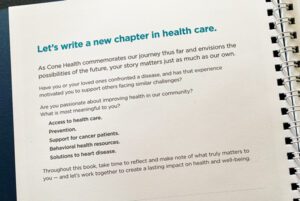On the corner of a desk, a well-loved journal rests in a hard-bound burgundy and gold cover. Colorful tabs peek out across the top and side; it’s the kind of book that has been cherished by its owner for some time, bearing the marks of frequent use.
The journal belongs to Mae Douglas, a Greensboro native and retired corporate leader. I am here to interview her for a story slated for Cone Health’s impact report — the giving effect, a publication we developed for the health system’s Philanthropy division.
Conducting interviews and discovery workshops involves deep listening and is, ultimately, what allows an organization’s voice to emerge. That’s why I’ve always found the interview process to be just as gratifying as the storytelling itself. My conversation with Mae proves no different. She exudes warmth, honesty and an open demeanor.
Mae, a passionate community servant and advocate, shares her desire to help improve health in historic East Greensboro, where she grew up. Her recent million-dollar gift is poised to bolster Cone Health’s mission to offer health and wellness programs where they’re most needed.
“I’ve been on a journey about philanthropy and what it means,” Mae explains. “When I returned to Greensboro years ago, I knew I had to create a different vision for my life because 37 years of it had been about climbing the corporate ladder. I had to figure out what I was going to do from that point forward.”
And so, she started putting her thoughts onto paper.
One journal entry, dated Feb. 13, 2012, includes a personal vision statement that ultimately became the seed for her generous gift to Cone Health and East Greensboro.
This interview, this journal, ignited a creative spark for Tigermoth and our partner, Cone Health Chief Philanthropy Officer Michelle Schneider. Michelle appreciated Mae’s introspective approach when considering her donation to the Campaign for Healthy Communities. It reminded her of her own journal, a book she asks her donors to write in after making their contributions. For Michelle, who places a premium on relationships, it’s important for her donors to connect with their most meaningful reasons for giving.
 When developing the creative approach for Cone Health’s first capital campaign case statement, we drew inspiration from both Mae and Michelle. Our team created a piece that educates donors about Cone Health’s fundraising priorities while inspiring them to interact with the book as they contemplate their own philanthropic legacy. The case statement, which includes journal pages and an invitation to readers to “take time to reflect and make note of what matters most to you,” uses images, storytelling, and quotes to show that Cone Health genuinely cares about their community members and the health concerns that are closest to their hearts. The piece also features a pocket for donors to store their official giving paperwork, a record and a keepsake to be cherished.
When developing the creative approach for Cone Health’s first capital campaign case statement, we drew inspiration from both Mae and Michelle. Our team created a piece that educates donors about Cone Health’s fundraising priorities while inspiring them to interact with the book as they contemplate their own philanthropic legacy. The case statement, which includes journal pages and an invitation to readers to “take time to reflect and make note of what matters most to you,” uses images, storytelling, and quotes to show that Cone Health genuinely cares about their community members and the health concerns that are closest to their hearts. The piece also features a pocket for donors to store their official giving paperwork, a record and a keepsake to be cherished.
“This is exactly the kind of piece we wanted — a case statement that shares our vision for improving health in our communities and asks donors what their own vision is. We want to do this work together, alongside our community members, and I can’t think of a better way to facilitate meaningful conversions and partnerships.”
Michelle Schneider
Chief Philanthropy Officer, Cone Health

